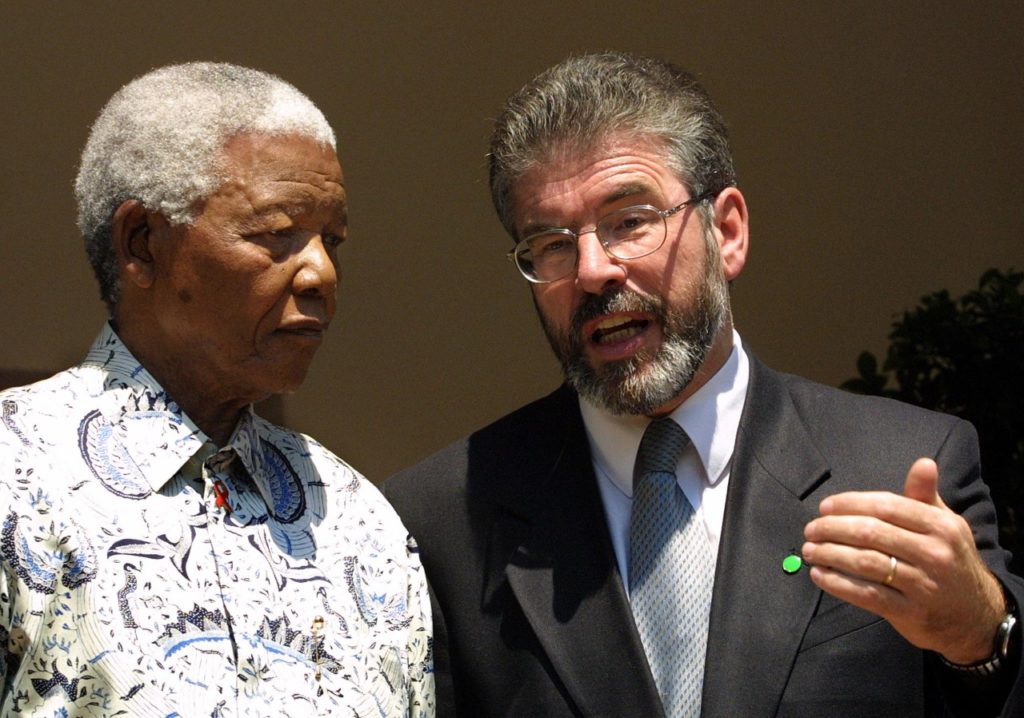A picture says a thousand words.
A selfie of Joe Biden and Gerry Adams taken at the US President’s address to the Oireachtas has caused quite a stir.
All smiles and bonhomie.
Old pals, it seemed.
The President beaming and Gerry with his fashionable round glasses and grand-fatherly beard. Behind the two of them, unbeknown to either man, lurked Bertie Ahern.
His re-emergence on the public stage has fuelled rumours of a presidential bid in 2025 when Michael D Higgins is obliged to step down after two terms in office.
But there is also the intriguing rumour doing the rounds that the former Sinn Féin President might also be limbering up for a run.
Which makes this image all the more poignant.

Could Gerry Adams become the next President of Ireland?
If name recognition counts, then everyone’s certainly heard of him.
A good start, but a double-edged, sword — given he was president of Sinn Féin throughout the second half of the Troubles.
And while he strenuously denies that he was ever a member of the IRA, it is easy for his opponents to paint him into that corner.
The advantage he has, though, is that at least everyone knows who he is and what he represents. His baggage, so to speak, is out there in full view.
Still, it would be a bumpy ride in the Dublin media.
The capital’s elite would throw everything at him; but the same tactic is hardly working against Sinn Féin these days, given they are miles ahead in every poll.
For younger people, memories of the Troubles are sketchy.
They have moved on.
Many will regard Gerry Adams as a benign figure they are used to seeing leading delegations to Downing Street or rubbing shoulders with the high and mighty.
And, after all, isn’t that what heads of state are supposed to do?
As well as US presidents — there are also pics of him with Clinton, Bush, Obama and even Trump — there are no shortage of photos of Adams with Nelson Mandela. (He was even part of Madiba’s honour guard at his funeral in 2013).
Some will argue that southerners don’t like ‘Nordies’ and that his colleague, Martin McGuinness, didn’t get very far when he stood in 2011, receiving just 13.7 per cent of the vote.
But Adams is a far cannier operator and unlike McGuinness, sat in the Dáil for nine years before retiring in 2020, making him much more familiar to southern voters.
And it bears stating: this is 2023, not 2011.
A lot has changed and Sinn Féin has gone mainstream in the intervening years.
By the time the presidential election takes place, they might well find themselves in government.
The latest possible date for the general election to be called is March 2025, with the presidential vote coming six months later.
Adams might get carried along in that wave of enthusiasm for Sinn Féin, which might still be basking in the warm approval of a post-election honeymoon with voters.
We are still some way off candidates declaring, but if Gerry Adams does stand, you heard it here first.
Anti-Irish bigotry on display in parts of the British media
Truly, you would need a heart of stone not to laugh.
The right wing British media’s reaction to President Biden’s Irish trip (north and south) has seen a fair degree of hyperventilating, it is fair to say.
‘Nutty’ would be another word.
The anti-Irish bigotry that never sits far under the surface in some of our newspapers and periodicals came bubbling to the surface in all its putrid hues.
The Times cartoonist, Peter Brookes, depicted Biden as a dancing leprechaun, holding (what else?) a pint of Guinness. “I just love Northern Ireland,” he says, with ‘northern’ written in smaller font.
Meanwhile, The Sunday Times columnist Rod Liddle, a contrarian and supposed wit (well, half of one), surpassed himself, referring to the President as “a senile, gibbering leprechaun”.
He berated Irish-Americans for their ‘Oirishness’ claiming it was merely ‘an affectation, the becoming cloak of the underdog, and rooted in falsehoods, stereotypes, ignorance and things badly misremembered.’
Wow.
Not to be outdone, the right wing Spectator magazine had this: “While most US presidents pride themselves on being ‘American as apple pie’, Biden identifies as ‘Irish as Paddy’s pig’.”
Galling, yes. Unpleasant, certainly. But revealing, too.
It is now British right wingers — imperialist wannabes — who have the inferiority complex. Who pine for the lost love of a US president.
Their foaming chauvinism requires that soothing promise of ‘the special relationship’.
Outwitted by Paddy over Brexit, John Bull yearns for the certainties of yesteryear.
Alas, Irish ‘soft power’ came out on top again during President Biden’s trip.
Rishi Sunak had been told to get the Windsor Framework deal passed and then strongarm the DUP back into government ahead of Biden’s trip.
Having been such an assiduous friend of Ireland and the peace process during his long years in the US Senate, the President was looking forward to celebrating the achievements of the past 25 years.
Instead, he was greeted with a job half-done.
Sunak managed to get the Windsor deal through both House of Parliament - with thumping majorities it bears telling - but then failed to put the thumbscrews on Jeffrey Donaldson and his party.
As a result, the anniversary of the Good Friday Agreement was a bittersweet affair, with Stormont still mothballed.
So, Biden’s team cut their losses and curtailed the visit.
Joe couldn’t wait to get across the border!
The Americans don’t mess about. You either deliver what you promise or you’re down the road.
The White House is said to be seething that Sunak didn’t tee-up things properly. As a result, the British PM was relegated to a tea break photo opportunity where, it was noted, President Biden didn’t even make eye contact with him.
One reporter even speculated than a nervous Rishi was drinking from an empty cup.
Hey, Brookes, how about a cartoon depicting that?
Kevin Meagher is author of ‘A United Ireland: Why Unification is Inevitable and How it Will Come About,’ and ‘What A Bloody Awful Country: Northern Ireland’s Century of Division’


